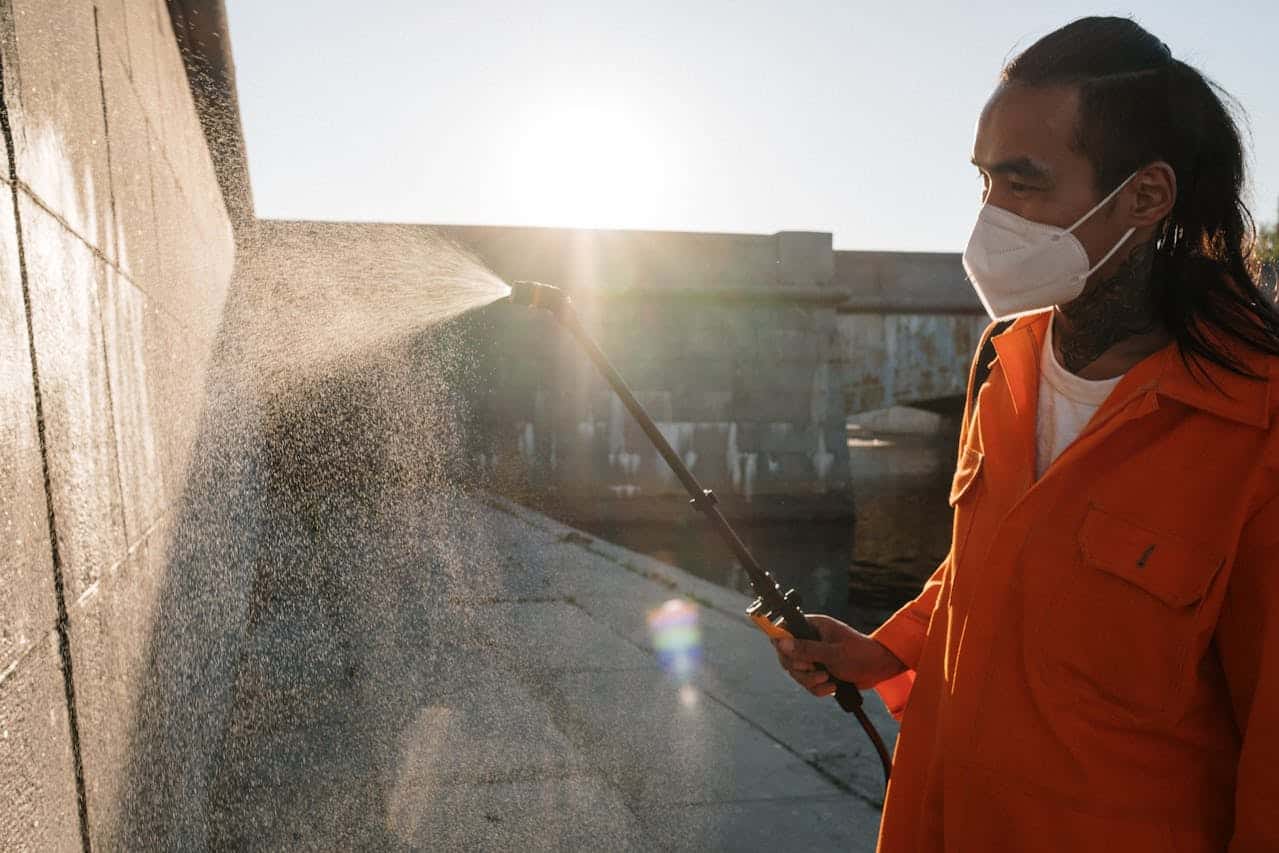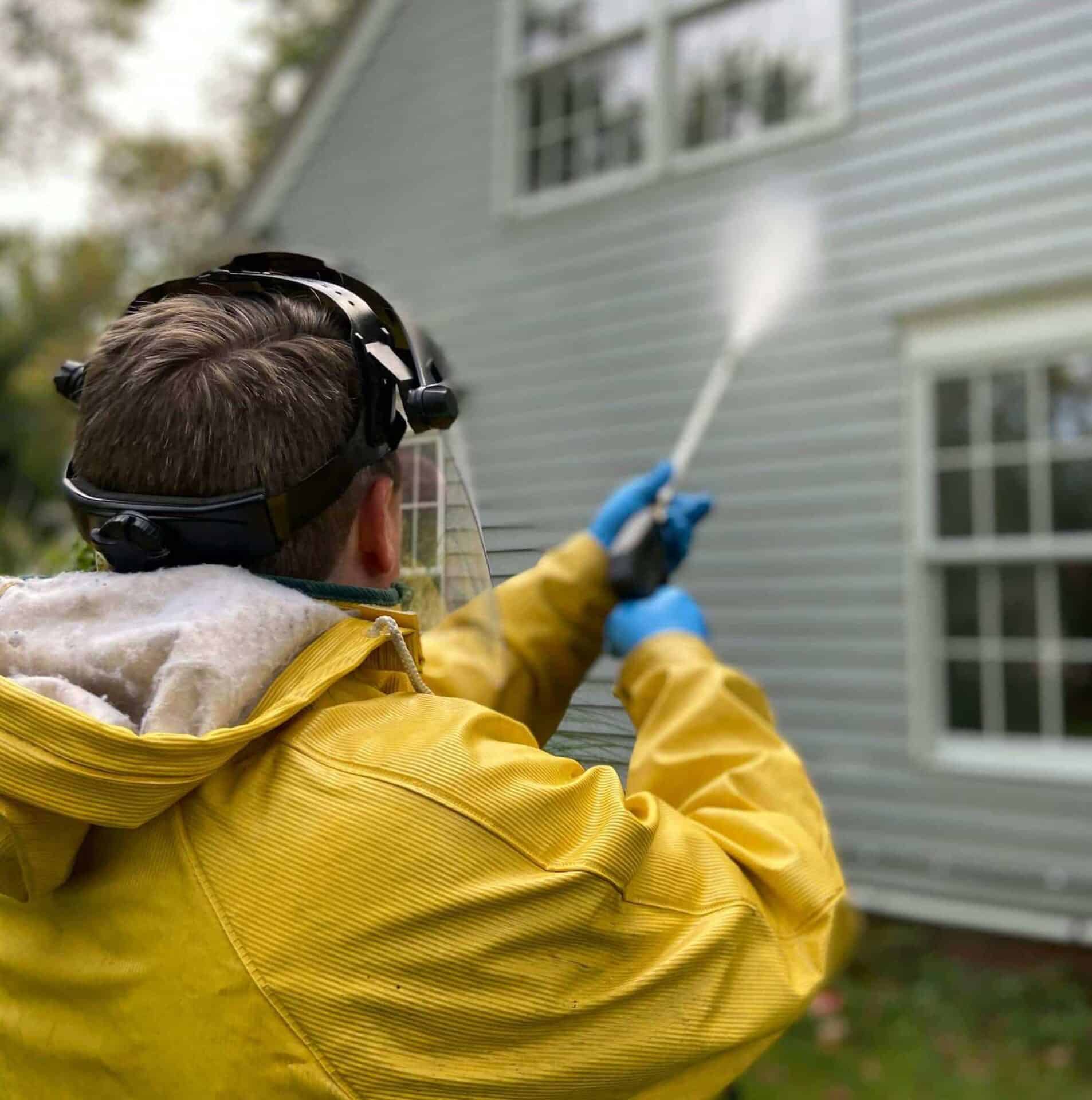Here in Hamilton, it doesn’t take long for the outside of your home to start looking tired. With regular rain, humid summers, and plenty of tree cover in some areas, our houses collect mould, lichen, and dirt fast. Over time, this build-up not only looks bad, it can also damage paint, cladding, and timber if left untreated.
That’s why regular house washing is so important for Hamilton homeowners. Professional cleaning helps protect your home, keeps it looking sharp, and saves money on future repairs. But when it comes to house washing Hamilton properties, should you go for soft washing or water blasting?
In this guide, I’ll break down both cleaning options and explain why soft washing is usually the better choice for house washing Hamilton homes, especially for properties here in the Waikato region.
What Is Soft Washing?
Soft washing is a low-pressure cleaning method that’s become increasingly popular for house washing Hamilton properties. It uses gentle water flow mixed with specialised cleaning solutions to treat and remove grime for safer exterior cleaning. These solutions break down mould, algae, and dirt before everything is rinsed off carefully.
It’s a safe and smart option for most Hamilton homes, especially if you have:
- Painted weatherboard or timber cladding
- Textured surfaces like stucco or plaster
- Cedar or other natural timber exteriors
- Delicate painted finishes
The key benefit of this cleaning method? The solution kills mould spores at the root, meaning your house washing Hamilton results last longer. That’s important in our damp climate, where growth can return quickly if it’s not properly treated.
Soft washing is also easier on your home’s exterior during the cleaning process. It won’t chip paint, force water into cracks, or damage older surfaces. That makes it ideal for regular maintenance.
What Is Water Blasting?
Water blasting, also known as pressure washing, is another cleaning method that uses a high-powered stream of water to blast away dirt. While it’s quick and effective on hard surfaces, it can be too aggressive for many house washing jobs.
This technique is best suited for jobs like:
- Concrete driveways and footpaths
- Brick or block walls
- Decks or patios with heavy moss or grime
When used on the wrong surfaces, though, water blasting can do damage. It can strip paint, dent timber, or even push water behind cladding during the cleaning process. This can lead to hidden rot or moisture problems later on.
That’s why water blasting should be reserved for tough outdoor surfaces during house washing Hamilton projects, and used with care if you’re working close to the house itself.
Why Soft Washing Might Better for Most Homes
Soft washing is usually the better choice for most Hamilton properties, especially when it comes to protecting your home’s exterior over time during regular cleaning.
It’s gentle. Unlike water blasting, soft washing won’t strip paint, dent timber, or damage your cladding. That matters when your cleaning project involves painted weatherboards, older timber, or textured coatings, which are all common around Hamilton.
It also treats the problem at the source. The cleaning solution used in soft washing kills mould and algae down to the roots. That means your results stay cleaner for longer, even in damp or shaded areas.
Soft washing is safer too. There’s less risk of forcing water into cracks or behind cladding during the process. In a region like ours, where heavy rain and moisture are common, that’s important for avoiding long-term water damage.
And finally, it’s better for the environment. Soft washing uses less water and biodegradable cleaners. That’s helpful during summer water restrictions, and better for your garden and local drains.

Cleaning Methods: Soft Washing vs Water Blasting Comparison
Let’s compare the two methods side by side for house washing properties:
| Factor | Soft Washing | Water Blasting |
| Effectiveness | Kills mould and algae at the root for longer-lasting results | Removes surface dirt only; doesn’t treat the underlying cause |
| Surface Safety | Safe for all exterior materials, including timber, paint, and textured surfaces | Can damage paint, dent timber, and force water behind cladding |
| Environmental Impact | Uses targeted, biodegradable chemicals and less water | Uses more water and creates more runoff |
| Best Use Case | Ideal for houses, roofs, painted surfaces, and delicate exteriors | Suited to concrete, driveways, patios, and hard outdoor surfaces |
Why Your Cleaning Method Matters in Hamilton and the Waikato Region
1. Moist Climate & Volcanic Dust Affects House Washing
Hamilton’s damp climate and volcanic soil mean mould and grime build up faster here than in other places, making regular cleaning essential. Soft washing is better at treating these issues during house washing Hamilton projects, especially on shaded or south-facing walls.
2. Winter Frosts at Altitude Impact Cleaning
In higher parts of the Waikato, winter frost can weaken paint or timber, affecting your cleaning approach. Water blasting in these conditions can make things worse. Soft washing is a safer choice year-round for Hamilton properties.
3. Summer Water Restrictions Affect House Washing Hamilton
During dry months, Hamilton often sees water use limits that impact cleaning schedules. Soft washing is more efficient with water, which means you stay compliant while still keeping your home clean through professional services. Check here to see what the current water restriction level for Hamilton is.
Choosing the Right Approach for Your Property
Choosing the right cleaning method depends on the type of surfaces around your home, the level of grime, and the look you’re after. Here’s how to decide what’s best for your house washing Hamilton project:
1. Identify the Surface
Start by looking at what your house is made of before beginning cleaning. Is it painted timber, cedar, brick, or plaster? If your exterior has paint, natural timber, or any soft surface, soft washing is the way to go. Water blasting is fine for harder surfaces like driveways or retaining walls during comprehensive cleaning projects.
2. Ask About Detergents
Not all cleaning solutions are made equal. When hiring a professional for house washing Hamilton services, ask what they use. Make sure it’s safe for pets, plants, and the environment. Reputable Hamilton companies will use biodegradable, low-tox products.
3. Check Experience & Insurance
It’s always best to use a company that knows Hamilton homes and weather conditions. Ask about their experience with similar properties and check that they’re fully insured in case anything goes wrong during cleaning.
4. Time Your Cleaning Right
Plan your exterior cleaning when the weather is mild and dry – ideally in spring or early summer. This gives surfaces time to dry and reduces the chance of rain undoing the work. Avoid cleaning during frosts or heatwaves.
Some FAQs
How often should I schedule house washing in Hamilton?
Every 12–18 months is a good rule of thumb. If your home is shaded, near trees, or gets a lot of moisture, annual cleaning is ideal for Hamilton properties.
Is soft washing safe for all cladding types?
Yes. It’s gentle enough for all surfaces, including older timber, painted walls, and textured coatings common in New Zealand homes.
Can water blasting damage my home during cleaning?
Yes. If used incorrectly, it can strip paint, crack plaster, or push water into walls. That’s why it’s better suited for hard solid surfaces like driveways, decking and concrete rather than exterior of our homes for washing.
Final Thoughts
Soft washing is usually the best choice for most Hamilton homes. It’s gentle, effective, and helps keep your house looking sharp without risking damage. Water blasting can work for hard outdoor surfaces, but it’s not ideal for painted cladding or timber during house washing projects.
If you want your home cleaned properly, and safely, through professional cleaning, soft washing is the smart option. Always go with a local expert who knows the conditions here in the Waikato for your house washing needs. Your home will thank you for choosing the right cleaning method.
Looking to work your way though some other areas of home maintenance? Check out our guide on finding the best time to remove roof moss.
